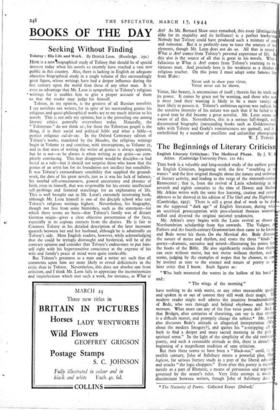BOOKS OF THE DAY
Seeking Without Finding
Tolstoy : His Life and Work. By Derrick Leon. (Routledge. 258.) HERE is a new%iographical study of Tolstoy that should be of special interest today when his novels so recently have reached a vast new public in this country. Also, there is lacking in English an adequate objective biographical study in a single volume of this outstandingly great figure, whose writings have had a deeper influence during the last century upon the world than those of any other man. It is even an advantage that Mr. Leon is sympathetic to Tolstoy's religious writings for it enables him to give a proper account of them so that the reader may judge for himself.
Tolstoy, in my opinion, is the greatest of all Russian novelists. I say novelists not writers, for in spite of his outstanding genius his religious and quasi-philosophical works are to me much inferior to his novels. This is not only my opinion, but is the prevailing one among literary critics generally everywhere today. Naturally, the " Tolstoyans " do not think so ; for them the Tolstoyan gospel is the thing, it is their social and political bible and what a bible—a perfect religious cul-de-sac. In the Oxford Centenary edition of Tolstoy's works, translated by the Maudes, the religious writings begin in Volume II and continue, with interruptions, to Volume 21, and in that mass of writing the writer of genius is always apparent, but he is not—as he always is when writing as an artist—so com- pletely convincing. This may disappoint would-be disciples—a bad breed as a rule—but it slimed not surprise those who know that the genius of an artist has for its foundation not intellect but sensibility. It was Tolstoy's extraordinary sensibility that supplied the ground- work, the data of his great novels, just as it was his lack of balance, his morbid self-consciousness, general uncertainty and absence of faith, even in himself, that was responsible for his erratic intellectual self-probings and frenzied searchings for an explanation of life. This is well brought out in Mr. Leon's extremely interesting book, although Mr. Leon himself is one of the disciple school who rate Tolstoy's religious writings highest. Nevertheless, his biography, though not free from some blemishes, such as the statement—for which there seems no basis—that Tolstoy's family was of distant German origin—gives a clear objective presentation of the facts, especially in its copious extracts from the diaries. He is fair to Countess Tolstoy in his detailed description of the later incessant quarrels between her and her, husband, although he is admittedly on Tolstoy's side. Most English readers, however, while acknowledging that she could be tryingly distraught and hysterical, will be of the contrary opinion and consider that ,Tolstoy's endeavours to put him- self right with his hypersensitive conscience at the expense of his wife and family's peace of mind were quite intolerable.
But Tolstoy's greatness as a man and a writer are such that all comments upon him are more likely to reveal deficiencies in the critic than in Tolstoy. Nevertheless, this does not absolve one from criticism; and I think Mr. Leon fails to appreciate the inconsistencies and imperfections which mar such a work, for instance, as What is Art? As Mr. Bernard Shaw once remarked, this essay (distinguish alike for its stupidity and its brilliance) is a perfect booby-tr Nobody but Tolstoy could have produced such a mixture of se and nonsense. But it is perfectly' easy to trace the sources of bo elements, though Mr. Leon does not do so. All that is sound What is Art? comes"from Tolstoy's personal experience of life. B this also is the source of all that is great in his novels. What fallacious in What is Art? comes from Tolstoy's yearning to be virtuous man. And precisely here is his weakness as a thinker religious teacher. On this point I must adapt some famous lin from Blake:
Never seek to show your virtue, Virtue never can be shown.
Virtue, like beauty, is unconscious of itself ; therein lies its truth a its power. It comes by grace not by wanting, and those who wa it most (and their wanting is likely to be a mere vanity) a least likely to possess it. Tolstoy's ambitious egoism was radical, b the sensitive intensity of his nature was such that if he failed to a good man he did become a great novelist. Mr. Leon seems u aware of all this. Nevertheless, this is a serious full-length, wz.- documented biography (outstanding books such as Goldenweiser' talks with Tolstoy and Gorki's reminiscences are quoted), and it embellished by a number of excellent and unfamiliar photograp
W. J. TURNER.


























 Previous page
Previous page